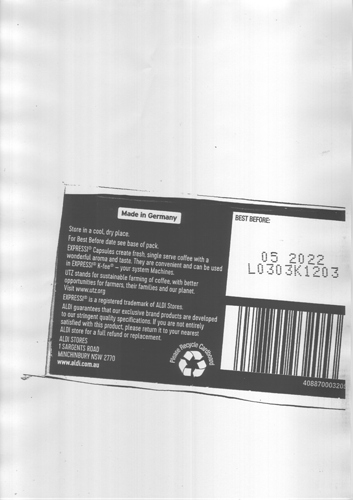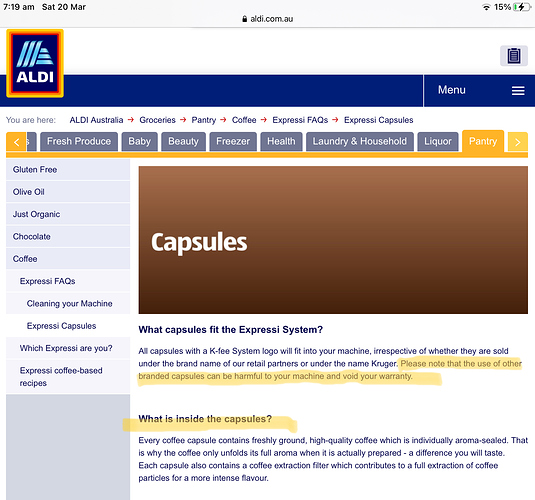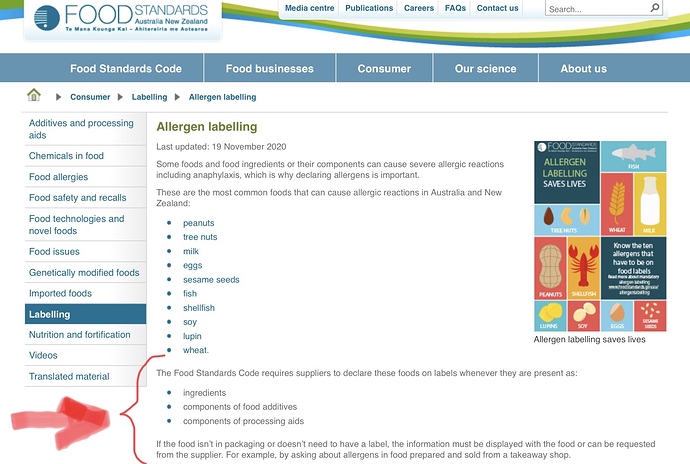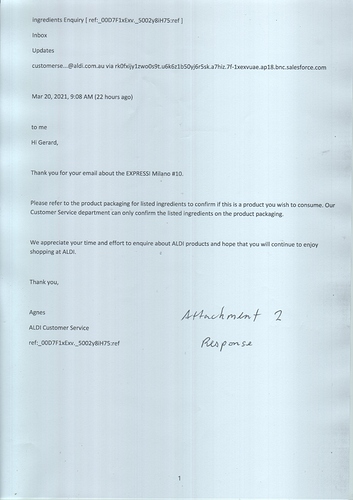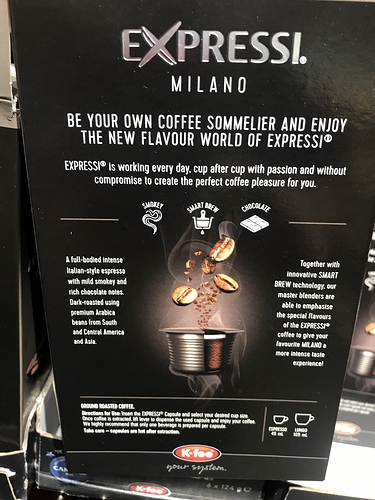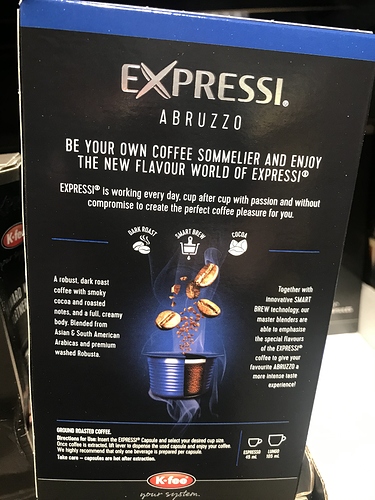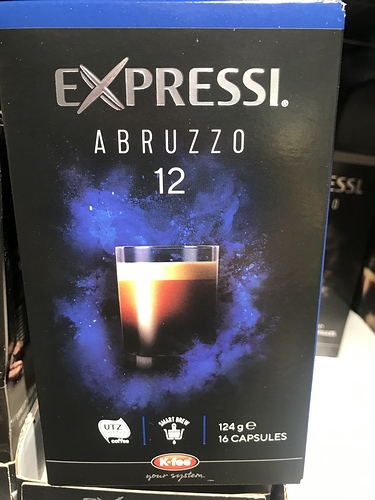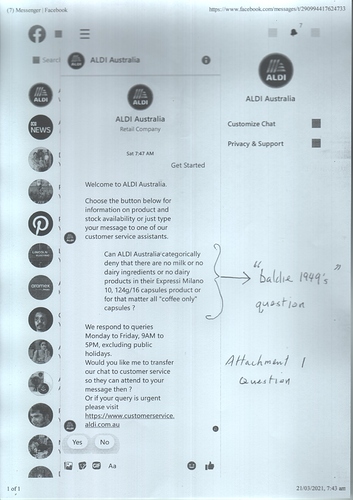Correct me if I am wrong but I cannot find any info. about food content on the cardboard box containing sixteen (16) capsules of this coffee. Is it unlawful not to have food labelling? I have attached a scanned copy of the back of the cardboard box for your perusal. I am having trouble finding out if these capsules contain milk. Can someone help please.
If you mean nutritional labelling, then stock standard coffee is exempt from containing such labels.
See s.2.2 of:
If you mean ingredients listing, possibly yes:
It may get away from not having a specific ingredients list if the product states something like contains 100% robusta coffee beans or 100% coffee. If it doesn’t, then it possibly should have a ingredients list. There are no exceptions for (retail) coffee in the above food standard.
This matter was raised by me partly because consumers who are lactose intolerant will experience diarrhoea.
Is the best one to ask Aldi to be sure? It’s their product? It would seem reasonable if a product contains added lactose it should be identified on the package. In the same way products that contain or may contain added nut or egg based portions.
In the interim.
Aldi say this in their FAQ’s for the coffee capsules.
Consumers might also note the warning against using non Aldi capsules and it voiding warranty. It skirts Australian Consumer Law, depending on how you read the turn of phase? As an average consumer, or as an Aldi legal representative.
Pure Aldi!
It’s likely the ACCC has other more important things to do, with it’s very limited budget.
This reminds me of all the “knowledgeable and well trained” doctors I have seen in the approx. last 10 years who couldn’t even ask the very basic question ", “are you lactose intolerant?” Eventually I found out, no thanks to “doctors” that taking lactose/dairy was the cause of my stomach problems. Trust is great but useless without verification.
That’s not what any of us would want.
Food Standards Australia and New Zealand provides clear directions for the labelling of products containing potential allergens. See section as indicated.
.
.
.
The requirement - includes declaring any of the listed products or their derivatives on the product. If Aldi’s capsules include milk based product it’s required to be declared on the product.
A guide to FSANZ general labelling requirements can be found here.
Their website only indicates that they contain coffee, and not all ingredients. It is a big ambiguous from the information on the packaging and website if there are other ingredients as well.
If the packaging doesn’t include ingredients as an oversight, then allergen list could be another oversight.
If I were allergic/anaphylactic to particular food ingredients, I would not be using these capsules unless there is formal conformation from Aldi in relation to ingredients and also allergens.
Or it’s not required, as you suggested?
The Standard says, Exempt per clause 3.1 of your prior reference.
Hopefully this explains how it is and why it is.
Whether it needs to be any different or whether suppliers can be trusted to label products correctly.
Is there any evidence that the current requirements are not effective, in particular with respect to coffee capsules products?
Note:
Nespresso and L’Or capsules also do not list any ingredients on their packaging other than the product name coffee.
That you must use a capsule that fits the type of machine is I think pretty common among all the machines. In regards to ALDI the fitting they use is explained as noted in the picture supplied by @mark_m above :
" What capsules fit the Expressi System?
All capsules with a K-fee System logo will fit into an Expressi coffee machine, irrespective of whether they are sold under the brand name of our retail partners or under the name Kruger"
Anything that doesn’t meet that fitting type is not supported and would void warranty, if a generic/other brand capsule met that K-fee system design then it wouldn’t void warranty.
About K-fee and I suggest reading the timeline snippets might provide some answers about capsule design and use (they have an adapter to use their K-fee capsules on the Nescafe® Dolce Gusto® machines)
The ALDI Milk Based range is the Hot Chocolate
As regards other capsule based systems even Nescafe has a system and there are capsules that can be sourced that are compatible
“Capsules compatible with NESCAFÉ® Dolce Gusto® system”
From Nescafe
" Can I use other branded capsules in my NESCAFÉ® Dolce Gusto® machine? And is it safe to use compatible or refillable capsules with my machine?
We cannot comment on other companies’ capsules’ fit with NESCAFÉ® Dolce Gusto® machines. The NESCAFÉ® Dolce Gusto® capsules and the NESCAFÉ® Dolce Gusto® machines were designed to interact together - the interaction provides the in-cup quality that NESCAFÉ® Dolce Gusto® is known for."
I would also note that Crema doesn’t mean the use of milk but explains the froth generated by the extraction of coffee from the beans:
" The crema is produced by emulsifying the oils in the ground coffee into a colloid, which does not occur in other brewing methods"
If different capsules are filled using the same equipment, this should trigger allergen warnings due to risk of cross contamination. It often seen on many food products.
I asked ALDI to categorically state that there is no milk products in the Expressi Milano 10 capsules and they couldn’t do so, but they were very quick to pass the buck ( why am I not surprised ). I also went to their Facebook page and posed the same question and I expect the same response. What is the point of offering a help line ? In the meantime my stomach problem (lactose intolerant) disappeared when I stopped using this coffee capsule!. Is cream(y) the new black?, because anyone who has half a brain will know that when one makes a cup of “real” black coffee there is no visible evidence of any creaminess. I ask the question; in their desperation to sell their “black coffee” capsules is ALDI adopting the Michael Jackson syndrome and making things to look not so black in order to make their coffee look more appealing. In the meantime if one likes some crushed peanut hidden in your coffee I wouldn’t risk letting an anaphylactic child or person taking a sip or two.
Are you able to share your inquiry and a copy of the Aldi response?
How did they pass the buck?
If the product contains or has used in processing any type of product from the FSANZ listed allergens FSANZ requires they be included on the product labelling.
If the pods do not Aldi should be able to provide a direct reply that confirms there are no milk products included in the product or used in the processing.
Same for peanuts.
It’s a very simple question for Aldi to answer. It may be worthwhile Choice staff looking at it further? @jhook
Have you tried coffee produced from a different brand and or machine system? EG Nespresso.
I only drink fresh ground bean espresso at home and cafes/restaurants; some wineries and other venues only have French Press; some conference/banquet/reception centres serve a mystery drink called coffee, probably drip, possibly percolated or boiled; the latter are sometimes the problem for me and I have always attributed it to their unbalanced bitterness. Visiting a mate who had an Espressi machine and used Aldi pods was educational as some pods were fine, and some had (for my taste) that unbalanced bitterness leading to unsettled issues.
This issue came about after I decided to broaden my experience with coffee and tea but I am glad it has come to this point because consumers are being involved hopefully. Sadly over the years the essence of good coffee and good tea (if they exists) has been polluted by sugar and the billion dollar sugar market. A case in point is in the USA for example where the use of sugar and consequently the girth has increased to disturbing levels. Undertakers and medical operating businesses say hurrah, bring it on.
Firstly my response to @jhook; thank you. I don’t have a problem with Nespresso capsules black coffee capsules; no lactose problems causing diarrhoea.
Follow-up to mark_m
Did you get Attachment 1 ( the question to ALDI ) If so I cannot see it
No, It’s possible as a newer member the system may have only permitted you to post one attachment.
It’s a very poor non response from Aldi. As though they don’t want to deal with the concern in a positive way. Referring your inquiry to the listed product contents says they did not even bother to look at what is on the product packaging.
You could post your Attach 1 in reply to this post, to complete the background.
Thanks. ![]()
P.S.
I make coffee at home from ground beans using a Sunbeam espresso machine, and also with the standard Nespresso capsules in a Breville machine. I have been known to OD on Java, but avoid so on hot tropical days when Working outside. Java + a risk of dehydration are not a good combination.
I take from the ALDI correspondence that they are confirming that the only ingredients are the coffee. They refer to the packaging because in some cases eg Hot Chocolate and if they supply lattes that these may contain milk.
As to Milano they describe it as an espresso so I don’t think it would contain milk. It is likely though that it develops a Crema, which while not milk based looks somewhat creamy and as linked above is a characteristic of some coffee types including Espresso.
“ Product Description
- A full-bodied intense Italian-style espresso with mild smoky and rich chocolate notes. Dark-roasted using premium Arabica beans from South and Central America and Asia.”
I would suggest that a black coffee in a cup is not always an Espresso, and so will not always have a Crema or creamy look. A Long Black I think still has a Crema but Coffee lovers can probably answer this better, and does an Americano have one?
Anyway Espresso blends will look creamy to a larger or lesser degree due to the roasting and varieties of the beans and once the water pushed through carries the colloids (oils, acids, and dissolved solids) into the cup it can look “creamy” without one drop of milk. Some people cannot tolerate the strong mixes and as @PhilT noted this can lead to upset gastrointestinal tracts. There is some evidence the Americano came about because the USA GIs in WWII didn’t tolerate/like the strong Italian blends so had hot water to add to break down the strength.
Cutting open an unused capsule might help answer if milk powder is found in it. I don’t think it will be found but it wouldn’t be a difficult test to carry out, it however might be a little messy.
All the packets display the Crema foam on the cups/tumblers of Coffee, this not cream or milk. On the packets content is marked solely as Ground Roasted Coffee. Hopefully my images captured that part well enough (I had to enlarge it to read it).
Attachment enclosed.
There is an update; I received a response stating that there is no milk products in the capsules and when I proposed that Choice Magazine may get involved by testing these particular capsules, she appeared concerned and referred to a web site (is it part of ALDI?) to report the issue
